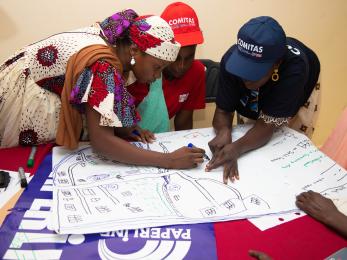Niger: Developing a Tool to Assess Community Vulnerability to Recruitment by Armed Extremist Groups

Mercy Corps Niger has developed and tested an assessment tool that helps identify communities that are most likely to contribute new members to the increasing number of armed extremist groups in the Sahel.
In recent years the violent extremist landscape in the Sahel has become increasingly complex, with crises in northern Mali and northeastern Nigeria spilling into neighboring countries, including Niger and Burkina Faso. Mercy Corps has been operating in Niger since 2005, implementing both long-term development and food security programming, as well as targeted humanitarian interventions. As the security situation in Niger’s border regions has worsened, the impetus to take action to address complex conflict dynamics has become more urgent.
In 2017, Mercy Corps Niger received funds from USAID to implement the Vulnerability and Resilience Assessment Initiative to Counter Violent Extremism. This program aimed to design and test a set of assessment tools to enable national, regional and local level state and civil society practitioners to identify communities most vulnerable to recruitment by violent extremist groups. The tools were tested in communities in the regions of Niger bordering Mali and Nigeria, as well as over the border in Burkina Faso. The pilot process was participatory, actively seeking community feedback on what factors were the most significant in determining vulnerability or resilience to recruitment. It also enabled Mercy Corps Niger to gain new insights into community perceptions of these factors themselves, such as their views on the quality of public services, current security situations and religious freedom. The detailed results of this pilot program are presented in the program’s comprehensive report and are helping Mercy Corps to develop new programs to stem the growth of violent extremist groups in the region.


